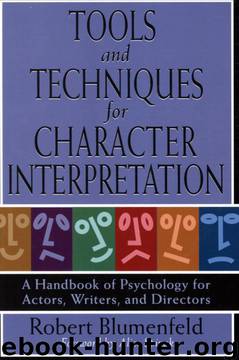Tools and Techniques for Character Interpretation: A Handbook of Psychology for Actors, Writers, and Directors by Robert Blumenfeld

Author:Robert Blumenfeld [Blumenfeld, Robert]
Language: eng
Format: epub, mobi
Published: 2012-09-30T03:31:00+00:00
The Psychiatric Interview: In analyzing a patient, Sullivan would want all the details possible. Aside from using free association as a therapeutic technique and having the patient prepare a chronology of his or her life, he would interact with the patient by asking the sort of questions listed here when the patient was talking about a particular relationship situation. I have arranged them as a questionnaire:
I.Who is the person you are in a relationship with, as you perceive that person to be?
2.If this is a person with whom you choose to be in a relationship, as opposed to family members with whom you are in a relationship from birth on, how did you choose this person?
3.What were your criteria?
4.What actually happened in the course of the relationship?
5.What events took place?
6.Where were you?
7.What did you say to each other?
8.How did you interpret the meaning of what was said?
9.What was the general emotional "climate" of the relationship?
to.How did you experience it?
it.Was there a change in this emotional climate?
iz.If so, when?
How13. did it manifest itself externally-and internally, inside yourself?
14.What did the change mean to you?
15.Was it the beginning of the end or the end of the beginning?
Some other questions having to do with what Sullivan termed the self-system (patterns of behavior by which the self arranges its own security and avoids anxiety) might also be used for analyzing a theatrical character: What do you esteem and what do you disparage about yourself? What makes you feel vulnerable? How secure are you? Do you have reserves of security that will get you through a crisis? What do you do to restore your sense of equilibrium when something upsetting has happened?
Aside from the self-system, there is what Sullivan called the "rest of the personality," and he would study it developmentally. Again, he wanted every detail: When did a man first begin to shave? When did a woman first menstruate? How did the patient feel about those things? He would ask the patient for information about parents, siblings, other relatives, and people who were frequently in the family home as the child was growing up. He wanted as much detail as possible on all these relationships. Sullivan would ask the patient to describe both parents, and talk about what sort of people they were and what sort of images the patient had of them. He called the images people have of themselves and other people personifications. He wanted to know if the parents were respected in the community and what the family's economic circumstances were. He also wanted to know the patient's work and relationship histories. In short, he wanted to know the kind of information an actor wants to know in thoroughly analyzing a script.
Here are three examples of how someone might use the questionnaire for character analysis and interpretation, to help clarify issues and the overall arc of the part as well as objectives and obstacles. You can use the questions about events (4, 5, 6, and 7) to see how the scenes fit into the arc.
Download
Tools and Techniques for Character Interpretation: A Handbook of Psychology for Actors, Writers, and Directors by Robert Blumenfeld.mobi
This site does not store any files on its server. We only index and link to content provided by other sites. Please contact the content providers to delete copyright contents if any and email us, we'll remove relevant links or contents immediately.
| Acting & Auditioning | Broadway & Musicals |
| Circus | Direction & Production |
| History & Criticism | Miming |
| Playwriting | Puppets & Puppetry |
| Stage Lighting | Stagecraft |
Call Me by Your Name by André Aciman(20499)
Ready Player One by Cline Ernest(14644)
How to Be a Bawse: A Guide to Conquering Life by Lilly Singh(7472)
Wiseguy by Nicholas Pileggi(5770)
The Kite Runner by Khaled Hosseini(5170)
On Writing A Memoir of the Craft by Stephen King(4935)
Audition by Ryu Murakami(4923)
The Crown by Robert Lacey(4807)
Call me by your name by Andre Aciman(4676)
Gerald's Game by Stephen King(4641)
Harry Potter and the Cursed Child: The Journey by Harry Potter Theatrical Productions(4494)
Dialogue by Robert McKee(4389)
The Perils of Being Moderately Famous by Soha Ali Khan(4217)
Dynamic Alignment Through Imagery by Eric Franklin(4208)
Apollo 8 by Jeffrey Kluger(3702)
The Inner Game of Tennis by W. Timothy Gallwey(3679)
Seriously... I'm Kidding by Ellen DeGeneres(3628)
How to be Champion: My Autobiography by Sarah Millican(3590)
Darker by E L James(3512)
